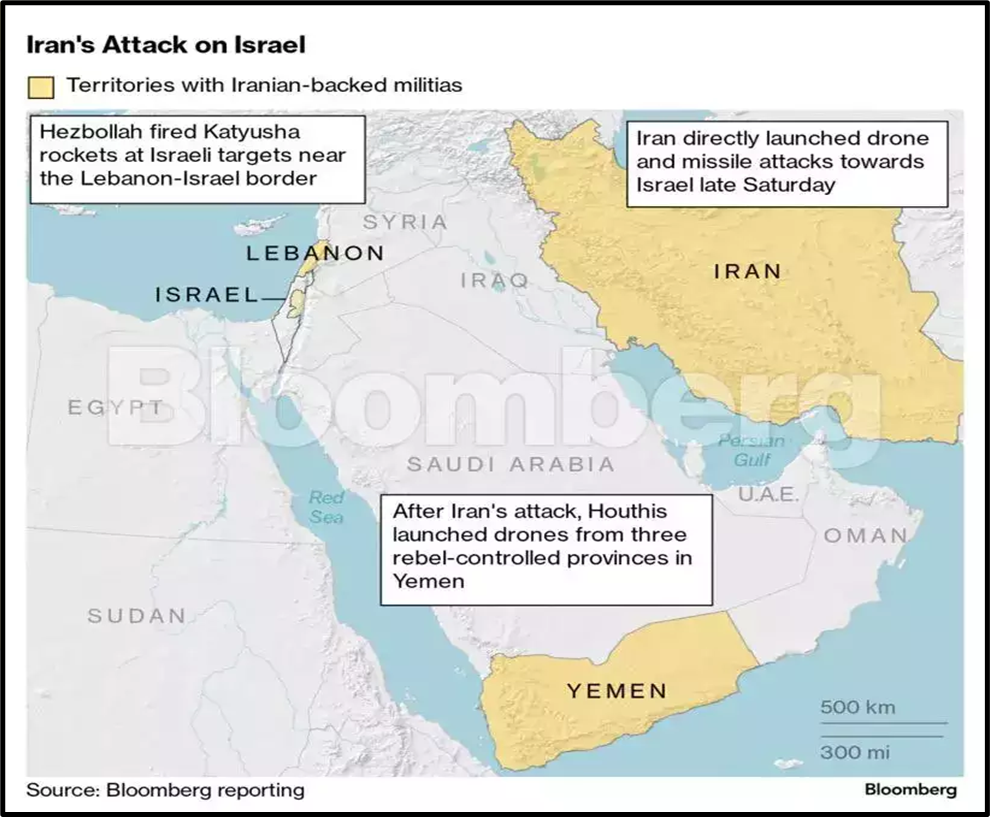SPECTRE OF RETALIATION
Syllabus:
GS-II: Governance, Constitution, Polity, Social Justice and International Relations
Why in the news?
Iran’s missile attack on Israel signals a significant escalation, challenging Israeli deterrence and potentially triggering further conflict.
source:medium
About The Situation:
- Iran launched a major missile attack on Israel, firing over 300 long-range projectiles, including drones and ballistic missiles.
- This is the first time Israel has faced a direct missile attack from a state since the Iraqi Scuds in 1991.
- The attack was a response to the killing of a senior Iranian military official in Syria, allegedly by Israel.
Understanding Significance of Iran for India:
Significance of Israel for India: Strategic Importance:
|
Understanding Israel Faces Unprecedented Missile Attack: Potential Response and Repercussions:
- Israel’s Defense and Minimal Damage
- Israel’s defensive system successfully intercepted 99% of the Iranian missiles, resulting in minimal physical damage.
- Despite the success, the attack is seen as a significant escalation and a challenge to Israeli deterrence.
- Iran’s Warning and International Response
- Iran claims it does not seek escalation but warns of a “stronger and more resolute” response to any further Israeli provocation.
- The US and other states condemn the Iranian attack but urge Israel to exercise restraint in its response.
- Israel’s Likely Response and Challenges
- The editorial argues that Prime Minister Netanyahu will likely respond to the attack.
- Symbolic retaliation is deemed insufficient, and a full-scale military attack on Iran is considered impractical due to distance and Iranian defences.
- Targeting key Iranian personnel, potentially within Iran, is seen as a possible strategy.
- Potential Outcomes and Repercussions
- An Israeli attack on Iranian soil could have unpredictable consequences, potentially escalating tensions and prompting retaliation from Iran and its allies.
- Not responding might be seen as a weakness and encourage future attacks.
- The editorial suggests a difficult situation for Israel, with limited options for a proportional response that effectively restores deterrence.
- Historical Context
- The editorial highlights Israel’s past experiences with attacks from non-state actors like Hamas and Hezbollah.
- It also mentions the limitations of previous responses, such as during the Gulf War when American intervention prevented Israel from retaliating to Iraqi Scud attacks.
Arising Concern: Possibility of an All-out War
- Dependence on Israel’s Response:
- The likelihood of an all-out war hinges on Israel’s reaction to Iran’s direct attack.
- A strong Israeli response risks escalating the conflict, potentially involving the US.
- Involvement of Other Countries:
- US and UK forces have already engaged in the escalation, downing Iranian drones in multiple locations.
- The US President reaffirmed unwavering support for Israel’s security.
- Impact on Balance of Power:
- Further escalation could lead to direct US involvement, altering the balance of power in the region significantly.
- UN Reaction:
- The United Nations urged Iran and Israel to exercise restraint to avoid a full-scale conflict.
- The Secretary-General warned against escalating tensions, but both parties continue to accuse each other.
About the Impact on the World:
- Economic Implications:
- Higher oil prices are expected due to increased tension, potentially exceeding $100 per barrel.
- Supply chain disruptions may occur if Iran follows through on threats to close the Suez Canal.
- The threat of inflation looms, impacting global economic growth projections.
- Challenge for International Diplomacy:
- The conflict may affect negotiations on the Iran nuclear deal and hinder peace processes in the region.
- National security concerns may supersede diplomatic resolutions.
- Impact on Global Political Alignments:
- US support for Israel may lead to shifts in international relations, with potential support for Iran from countries like Russia and China.
- Regional Destabilisation:
- Escalation between Israel and Iran could destabilise the entire region, involving countries like Syria, Lebanon, and Saudi Arabia in a broader conflict.
Understanding Iran-Israel Relations:
Pre-1979 Iran-Israel Relations:
- Iran recognized Israel soon after its formation in 1948, becoming the second Muslim-majority country to do so.
- During the Pahlavi Dynasty, under Shah Mohammad Reza Pahlavi, Iran maintained ties with Israel, benefiting from US support.
1979 Islamic Revolution:
- After the 1979 Islamic Revolution, Iran’s stance towards Israel shifted, viewing it as an occupier of Palestinian land.
- Iran aimed to challenge major regional powers like Saudi Arabia and Israel, both US allies.
Post-1979 Dynamics:
- Israel and Iran have avoided direct military conflict but used proxies and strategic attacks against each other.
- Israel targeted Iranian nuclear facilities, including through the Stuxnet cyberattack in 2010.
- Iran supports anti-Israel militant groups like Hezbollah in Lebanon and Hamas in Gaza.
Challenges Faced by India:
- Struggle to maintain neutrality between Iran and Israel as conflict intensifies.
- Test of resilience across political, diplomatic, economic, and security domains.
- Direct consequences for India’s people, economic interests, and strategic needs amid escalating conflict.
Impact on India:
- Risk to Indian communities in Israel, Iran, and the Gulf region.
- Disruption to strategic initiatives like the India-Middle-East-Europe Economic corridor.
- Economic repercussions including higher oil prices, inflation, and investor risk aversion affecting stock markets.
Way forward:
- Dialogue-based Diplomatic Solution: India historically favours dialogue. Increased engagement with Israel is crucial, considering Iranian actions sparked by Israeli attacks in Syria.
- Proactive Engagement: Israel must absorb initial drone attacks, showing restraint to prevent escalation. India should engage with key stakeholders like the USA, Iran, Russia, and Israel to contain conflict.
- Preventing Sustained Conflict: India needs to prevent Iran-Israel conflict, averting potential conflict with USA, already involved in regional tensions.
Conclusion
The Iranian missile attack is seen as a turning point, demonstrating Iran’s willingness to challenge Israeli dominance and potentially triggering further escalation. The pressure on Israel to respond decisively while acknowledging the risks and uncertainties associated with any potential retaliation.
Source: Indian Express
Mains Practice Question:
“Discuss the implications of Iran’s recent missile attack on Israel for regional security dynamics, considering its impact on Israeli deterrence and the potential for broader conflict escalation.”




